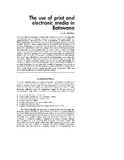| dc.description.abstract | One principle of Botswana’s Long Term Vision for 2016 is ‘An educated
and informed nation’ through access to electronic and paper media and
computer-based communication. The Department of Information and
Broadcasting Services (DIBS) survey provides background data to ensure equality of access among communities. User patterns and preferences for
viewing, listening and reading are determined using questionnaires,
interviews, observation and focus groups. The survey technique provided for systematic random samples from city, town, urban village and village areas, reaching over 1,700 respondents. Access to radio and television,
stations and times preferred, and newspaper readership are analysed by gender, age, education and income. Concludes that access in low income and rural areas should be increased by implementing more proactive education policies, equal employment and incomes policies, and the creation of rural community centres with television and radio. Radio and
TV should not take a back seat to Internet access. Information should be in multiple languages, not just principal and official languages, appropriate to age and educational level of the audience, and should include programmes with useful local content created by the users themselves. The free
newspaper should be more effectively distributed. | en_US |

